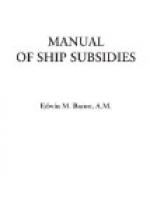In December, 1898, Senator Mark Hanna, of Ohio, brought forward a bill providing liberal navigation and speed bounties to all American vessels engaged in the foreign trade. This measure, as defined by its title, proposed “to promote the commerce and increase the foreign trade of the United States, and to promote auxiliary cruisers, transports, and seamen for Government use when necessary.” The subsidy was again termed “compensation.” It was to be payable on gross tonnage for mileage sailed both outward and homeward bound, according to speed. The rate to steamships showing on trial test a speed above fourteen knots was to increase proportionately; sailing-ships and steamers of less trial speed than fourteen knots, were to receive the lowest rate. This was fixed at one dollar and fifteen cents per gross ton for each hundred of the first fifteen hundred miles sailed both outward and homeward bound, and one cent per gross ton for each hundred miles over one hundred miles both ways. The additional speed bounties ranged from one cent per gross ton for steamers of 1,500 tons and speeding fourteen knots, to 3.2 cents for those over 10,000 tons and showing twenty-three knots. The act was to be in force for a term of twenty years, and no contracts were to be made under it after ten years.
The Hanna bill met strong opposition, and was finally dropped. A substitute measure, drawn by Senator Frye, of Maine, took its place. This also was lost with the adjournment of the Fifty-seventh Congress. At the opening of the next Congress, in December, 1901, Senator Frye introduced his bill in an amended form. This offered subsidies to contract mail-steamships based upon tonnage and speed, and practically restored the rates of the original Postal Aid Bill. It further provided a fixed subsidy upon tonnage to other American steamers and sailing-ships, registered, and to be built in the United States. The bill passed the Senate, but failed with the House.
* * * * *
In 1903 the matter was taken up with greater vigor, by President Roosevelt. In his annual message to Congress December 7, the President, “deeply concerned at the decline of our ocean fleet and the loss of skilled officers and seamen,” recommended the appointment by Congress of a joint commission to investigate and report at the next session, “what legislation is desirable or necessary for the development of the American merchant marine and American commerce, and, incidentally, of a national ocean mail service of adequate auxiliary naval cruisers and naval reserves.”
In response Congress by act of April 28, 1904, created the Merchant Marine Commission with power to make the broadest kind of an inquiry. This body was composed of five Senators and five Representatives, two of the Senators and two of the Representatives members of the minority party. Senator Jacob H. Gallinger of New Hampshire was chairman. Eight months between the adjournment and reassembling of




